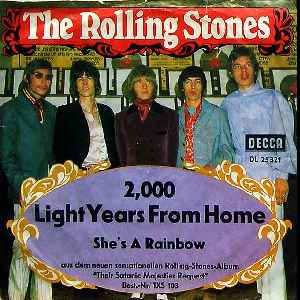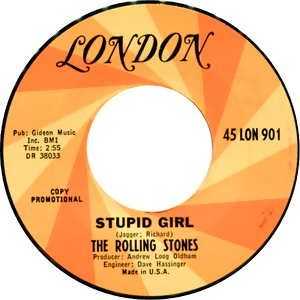
"Jumpin' Jack Flash" is a song by the English rock band the Rolling Stones, released as a non-album single in 1968. Called "supernatural Delta blues by way of Swinging London" by Rolling Stone magazine, the song was seen as the band's return to their blues roots after the baroque pop and psychedelia heard on their preceding albums Aftermath (1966), Between the Buttons (1967) and especially Their Satanic Majesties Request (1967). One of the group's most popular and recognisable songs, it has been featured in films and covered by numerous performers, notably Thelma Houston, Aretha Franklin, Tina Turner, Peter Frampton, Johnny Winter, Leon Russell and Alex Chilton. To date, it is the band's most-performed song; they have played it over 1,100 times in concert.

"Sympathy for the Devil" is a song by English rock band the Rolling Stones. The song was written by Mick Jagger and credited to the Jagger–Richards partnership. It is the opening track on the band's 1968 album Beggars Banquet. The song has received critical acclaim and features on Rolling Stone magazine's "The 500 Greatest Songs of All Time" list, being ranked number 106 in the 2021 edition.

"Not Fade Away" is a song credited to Buddy Holly and Norman Petty and first recorded by Holly and his band, the Crickets.

"Ruby Tuesday" is a song by the English rock band the Rolling Stones, released in January 1967. The song became the band's fourth number-one hit in the United States and reached number three in the United Kingdom as a double A-side with "Let's Spend the Night Together". The song was included in the American version of Between the Buttons.

"Honky Tonk Women" is a song by the English rock band the Rolling Stones. It was released as a non-album single on 4 July 1969 in the United Kingdom, and a week later in the United States. It topped the charts in both nations. The song was on Rolling Stone's 500 Greatest Songs of All Time list, and was inducted into the Grammy Hall of Fame.

"Let's Spend the Night Together" is a song written by Mick Jagger and Keith Richards, and originally released by the Rolling Stones as a double A-sided single together with "Ruby Tuesday" in January 1967. It also appears as the opening track on the American version of their album Between the Buttons. The song has been covered by various artists, including David Bowie in 1973.

"We Love You" is a song by the English rock band the Rolling Stones that was written by Mick Jagger and Keith Richards. Their first new release of the summer of 1967, it was first released as a single on 18 August in the United Kingdom, with "Dandelion" as the B-side. The song peaked at number eight in Britain and number 50 in the United States, where "Dandelion" was promoted as the A-side and peaked at number 14.
"Gimme Shelter" is a song by the English rock band the Rolling Stones. Written by Jagger–Richards, it is the opening track of the band's 1969 album Let It Bleed. The song covers the brutal realities of war, including murder, rape and fear. It features prominent guest vocals by American singer Merry Clayton.

"Get Off of My Cloud" is a song by the English rock band the Rolling Stones. It was written by Mick Jagger and Keith Richards for a single to follow the successful "(I Can't Get No) Satisfaction". Recorded at RCA Studios in Hollywood, California, in early September 1965, the song was released in September in the United States and October in the United Kingdom. It topped the charts in the US, UK, Canada, and Germany and reached number two in several other countries.

"She's a Rainbow" is a song by the Rolling Stones and was featured on their 1967 album Their Satanic Majesties Request. It has been called "the prettiest and most uncharacteristic song" that Mick Jagger and Keith Richards wrote for the Stones, although somewhat ambiguous in intention.
"Sittin' on a Fence" is a song written by Mick Jagger and Keith Richards of the English rock band the Rolling Stones. The song was given to the singing duo Twice as Much, who released it as their debut single in May 1966. This version became a Top 40 hit on the UK Singles Chart, and also received some attention in the United States, where it charted on the Billboard Bubbling Under Hot 100 Singles chart.

"Have You Seen Your Mother, Baby, Standing in the Shadow?" is a song by the English rock band the Rolling Stones. Written by Mick Jagger and Keith Richards, it was recorded in the late summer of 1966 during early sessions for what would become their Between the Buttons album. It was the first Stones single to be released simultaneously in both the UK and the US, and reached number five and number nine on those countries' charts, respectively.

"Mother's Little Helper" is a song by the English rock band the Rolling Stones. A product of Mick Jagger and Keith Richards' songwriting partnership, it is a folk rock song with Eastern influences. Its lyrics deal with the popularity of prescribed tranquilisers like Valium among housewives and the potential hazards of overdose or addiction. Recorded in December 1965, it was first released in the United Kingdom as the opening track of the band's April 1966 album, Aftermath. In the United States, it was omitted from the album and instead issued as a single in July 1966 during the band's fifth American tour. The Rolling Stones' twelfth US single, "Mother's Little Helper" spent nine weeks on the US Billboard Hot 100, peaking at No. 8, and it reached No. 4 on both Record World and Cash Box's charts.
"Ride On, Baby" is a song by English rock band the Rolling Stones. It was written by Mick Jagger and Keith Richards in 1965. It was first released as a single by Chris Farlowe in October 1966 and reached No. 31 on the British charts. The Rolling Stones' own version appeared a few months later on Flowers, an album released only in the US in June 1967. It was recorded during the Aftermath sessions in December 1965.
"Sweet Virginia" is a song written by Mick Jagger and Keith Richards, and was the sixth song on the Rolling Stones' 1972 double album Exile on Main St. The song is a slow country-inspired composition with a saxophone solo.

"19th Nervous Breakdown" is a song recorded by the English rock band the Rolling Stones. Written by Mick Jagger and Keith Richards, it was recorded in late 1965 and released as a single in February 1966. It reached number 2 on both the US Billboard Hot 100 and Britain's Record Retailer chart, while topping the charts compiled by Cash Box and NME.

"In Another Land" is a song by the Rolling Stones, released in December 1967 as the first single from the album Their Satanic Majesties Request, and credited solely to Bill Wyman. In America, London Records released it as a single a week before the album.

"2000 Light Years from Home" is a song by the English rock band the Rolling Stones, released on their 1967 album Their Satanic Majesties Request. Written by Mick Jagger and Keith Richards, it also appeared as the B-side to the American single "She's a Rainbow", and charted as a single in Germany.
"Think" is a Mick Jagger and Keith Richards composition. It first appeared as a Chris Farlowe single which reached No 37 on the UK Singles Chart in January 1966. The Rolling Stones' own version appeared, three months later, on their Aftermath album, with a rewritten third verse.

"Stupid Girl" is a song recorded by the English rock band the Rolling Stones. Written by Mick Jagger and Keith Richards, the song featured on the band's 1966 album Aftermath. It was also issued as the B-side of the U.S. "Paint It Black" single.














